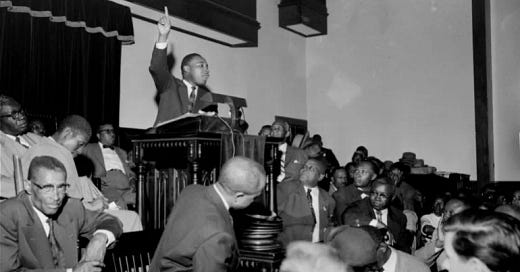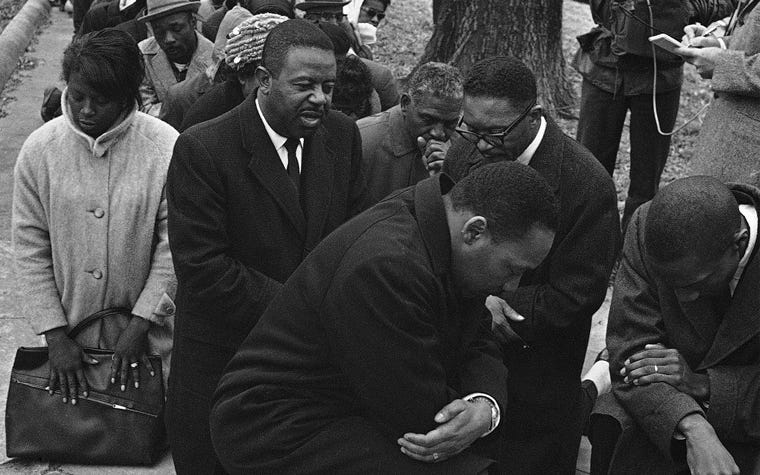Black Theology and The Call to Justice
The faith that drove the Civil Rights Movement (and why it’s important for disability rights)
As some of you know, I’ve been working on a manuscript for a book about Disability and the historically Black Church. Below is a short excerpt of what I’ve been working on. Enjoy and please share.
Black Christians knew that their presence in America presented them with unique challenges that would not allow them to simply accept the brand of Christianity that White Christians practiced. That brand of Christianity excluded them from public worship and excluded them from seeing themselves as image bearers.
The earliest iterations of Black theology provided Black Christians with a sense of dignity in a society that continually attempted to strip it away from them. “ The independent church movement among blacks was the first black freedom movement and the first stage of the battle against the perpetuation of injustice.”
In order to understand the spiritual engine of the civil rights movement, understanding Black theology is important. It would be nearly impossible to provide an extensive explanation of Black Liberation Theology, therefore my aim in this section is to explain some basic ideas about Black theology as well as some of the common critiques.
In the late 1800’s and early 1900’s, Christian churches began seeking ways to make an impact on the social conditions of their communities. The Social Gospel (or social Christianity as it was called back then), was an interpretation of scripture and a theological position developed from an activist’s perspective. “This activist interpretation of the Gospel of Christ first hit print and church agendas with figures such as Walter Rausenchbush, who urged Christians to apply their faith to the elevation of poverty.”
While the social gospel did serve as a much-needed connection point for the church to engage in the betterment of the community both spiritual and socially, the social gospel for many Black clergy and Black churches, seemed to ignore the role that racism played in the social conditions of minorities in America. Anthony Pinn writes:
African American ministers who found troubling the lack of attention to racism by white social gospellers rethought social Christianity in light of African Americans’ experience . Although not consistently observed, this race sensitive social Christianity was the general principle that shaped Black Church activity during reconstruction and before. And, it continued to be the operational stratagem for activist preachers throughout the twentieth century.
The Black Church adapted the basic premise of social Christianity and in doing so provided the motivation needed for the pursuit of civil rights for Blacks. Contrary to many assertions made about Liberation Theology in general and Black Liberation Theology specifically, the Black church did not see their commitment to justice as a replacement for the Gospel, they viewed their pursuit of liberation as a demonstration of their commitment to the Gospel. Black Liberation Theology was the result of the Black Church seeking to fulfill its obligation to behave as Jesus did, especially in light of his first public message recorded in Luke 4:14-20.
One of the pivotal moments in the development of Black Liberation Theology was the death of Martin Luther King Jr. in 1968. As a result of his death, the Black Church began to wrestle with the emphasis on non-violence as the primary strategy for its movement. Questions began to arise about the effectiveness of the non-violent strategy as well as the effectiveness of the Christian faith to successfully address the issues of racism, segregation, and violence against Blacks in the south. As a result, the Black Church and its clergy become more open to merging some elements of the Black Power movement with Black Church theology.
In 1969 a number of prominent Black clergy helped to develop a statement about the basic tenets of Black Theology. The document sought to simply define the burgeoning theological discussion surrounding the lived experiences of Blacks in America. The document provided three simple definitions for the term Black Liberation Theology. The term Black was associated with the Black Power movement, most notably popularized by Black leaders like Malcolm X. This term spoke to the political and social realities of Blacks in America. The term Theology was closely associated with Dr. King and his Black Church contemporaries.
This term spoke more closely to the religious leanings of Black Christians and their commitment to their Christian faith. Finally, the term Liberation was associated with Black Christians identification with their political and social pursuit of freedom as well as the ways in which they identified with the biblical story of Israel’s liberation from Egyptian oppression.
Black spirituality was born into a story that shaped its thirst for equality. In many ways Black Christians practiced a faith that demanded a level of patriotism that most White southern Christians had not tapped into. The plight of the Black Church was in essence the plight of the American Dream.
Despite efforts to portray civil rights leaders and Black Church goers as unworthy of full citizenship in America, it was the Black church and its leaders that argued for America and not against it. “The movement’s aim was not to destroy America’s constitutional democracy but to make it live up to its ideals. The nonviolent nature of the movement addressed the sense of justice of the majority, and the fundamental idea of willing social cooperation among freemen was, in the view of the community as a whole, expressed in the Constitution.”
Becoming full citizens of America and having the security to enjoy the protections of the constitution was fueled by an unshakable belief that God had also created Black bodies, to be citizens of his holy kingdom. Ultimately, I believe that Black spirituality deserves the right to claim its long-standing influence on both the civil rights movement and the disability rights movement.
The mixture of faith, blood, and tenacity propelled the worn bodies and minds of Black people in America who despite being overwhelmingly oppressed, garnered enough spiritual and political power to mold the nation into a slightly more just version of itself. This power isn’t merely based in political savvy. This power was a result of a piety that transcended the evils of slavery and Jim Crow. It is for this reason that both the civil rights movement and the disability rights movement must acknowledge the legacy of Black theology at the core of its success.
Works Cited
Gadzekpo, L. (1997). The black church, the civil rights movement, and the future. Journal of Religious Thought, 53/54(2/1),
JESUS AND JUSTICE: An Outline of Liberation Theology within Black Churches on JSTOR. (n.d.). http://www.jstor.org/stable/24461366
NEW PODCAST COMING THIS FALL!









Excellent article and summary of Black theology and the movement associated with it. Something that sorely needs clarity as false narratives have distorted clear understanding.